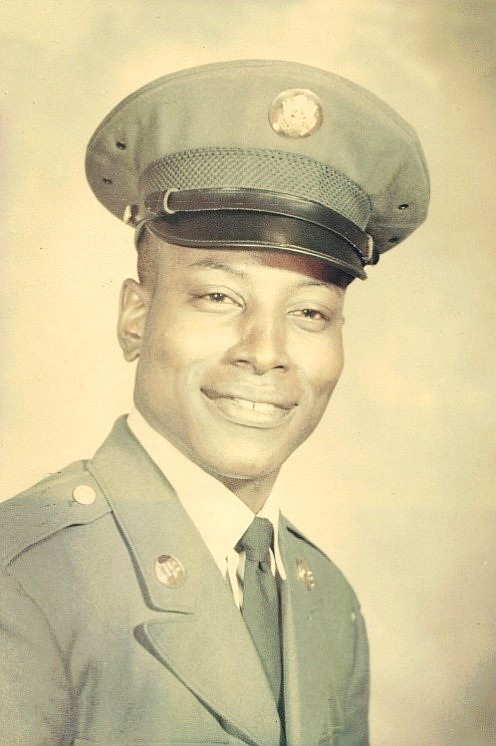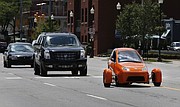For many years now, Don Hentges has volunteered for a number of local organizations to include Veterans Appreciation Night - a Thanksgiving-style dinner event held the first Thursday of November by Operation Bugle Boy.
This year's dinner, however, will hold special meaning for Hentges since the widow of a close friend killed in the Vietnam War will be an honorary guest.
Decades ago, when graduating from Russellville High School in the spring of 1966, Hentges recalls his father - an U.S. Army infantry veteran of WWII - encouraged him to enlist in the Air Force.
"If you enlisted, it was for four years; if they drafted you, it was for two years," he said. "I decided to take my chances with the draft."
Chances soon favored Uncle Sam when Hentges received his draft notice in the mail in the fall of 1967. Weeks later, he was on his way to Fort Leonard Wood to begin his basic training for the Army.
"When I finished my basic, they sent a bunch of us to Fort Polk, Louisiana, for advanced infantry training," Hentges said. "They really rushed us through the training - in about eight weeks, I believe - because the Tet Offensive was going on, and they needed us in Vietnam," he said.
He further noted, "We graduated from infantry training on May 4 (1968), and they sent me home for two weeks of leave. Then, I flew to Oakland, California, where we went through two to three days of processing and then took a commercial flight to Saigon."
Within days of his arrival in Vietnam, Hentges was assigned to Company D, 2nd Battalion, 506th Infantry of the 101st Airborne Division, which at the time was operating in the Central Highlands. Arriving to his new unit in the latter days of May 1968, Hentges began taking part in combat missions as a rifleman.
"We were an air cavalry unit so they'd put us on choppers and fly us into areas with a lot of enemy activity," he said. "From one day to the next, you didn't know where you'd be but I can tell you that we spent a lot of time on those Hueys (UH-1 Iroquois helicopter)."
The young soldier was soon exposed to the vagaries of war when the death of a fellow soldier necessitated that Hentges assume a new position within his platoon.
"It was during a firefight on July 13, 1968, that our machine gunner and assistant gunner were killed right next to me," he said. "The sergeant yelled for me to take over the machine gun and that was my job from then forward."
As Hentges recalled, he became a quick study when learning to use the platoon's M-60 machine gun. The proper use of the weapon had been demonstrated during their training cycle at Fort Polk; however, he missed the training since he was working in the mess hall on the day it was given.
In September 1968, a resupply helicopter arrived at their base camp and brought with it a replacement soldier named Willie McVea. Recalling how lost and concerned he had been when first arriving in Vietnam, Hentges approached McVea and the two quickly became friends.
"We hit it off right away because he was one of those guys that was always smiling," Hentges said. "He was from Texas and married with two daughters." Pausing, he added with a grin, "We'd razz each other, and I told everyone we got along so well because he laughed at my stupid jokes."
Assigned to the same squad, Hentges and McVea performed a number of missions together in the ensuing weeks, but an event unfolding on Nov. 19, 1968, brought an end to the military careers of both soldiers.
While patrolling along a riverbank after locating a crossing site for his platoon, Hentges and two of his fellow soldiers tripped a booby trap. The resulting explosion resulted in the death of the 26-year-old McVea. A secondary explosion a short while later severely wounded Hentges, who was medically evacuated for injuries to his legs and right eye.
Hentges eventually completed his recovery at Brooke Army Medical Center in Fort Sam Houston, Texas, where he remained until March 1969; three months later, he was discharged from the Army. His leg wounds healed, and the military was able to save his injured eye although he never regained sight in it.
The Purple Heart recipient married the former Lillian Haslag in September 1970 and the couple went on to raise four children. In the early years after the war, Hentges said, he wanted nothing more than to forget about Vietnam. However, as the years passed, he began to realize the time had come to act upon a promise.
"Willie (McVea) volunteered to go on that mission with me that day," Hentges said, recalling the date he was wounded in Vietnam. "When he died, I made a promise to myself and to him that his sacrifice would never be forgotten."
An active member of the Veterans of Foreign Wars, Hentges also serves as president of the Jefferson City Veterans Council and visits with local schools and community groups to share with others the story of McVea's sacrifice. Despite his efforts, he acknowledged, it was only in the last couple of years that he was able to make contact with McVea's family.
"My wife and I traveled to Texas to meet Bettye (McVea's wife) last year," Hentges said. "While there, we also visited Willie's grave site. It was a very emotional visit, and you can tell by the way Bettye speaks about Willie that she is still very much in love with him."
Later this week, Bettye and her youngest daughter, Kimberly, will travel to Jefferson City for the Veterans Appreciation Night dinner hosted by Operation Bugle Boy.
"I think that Bettye will be quite impressed with the hospitality she will receive while staying here in Mid-Missouri and will be pleased to see that the sacrifices of her husband have been - and will be - remembered," Hentges affirmed.
Jeremy P. Amick writes on behalf of the Silver Star Families of America.


